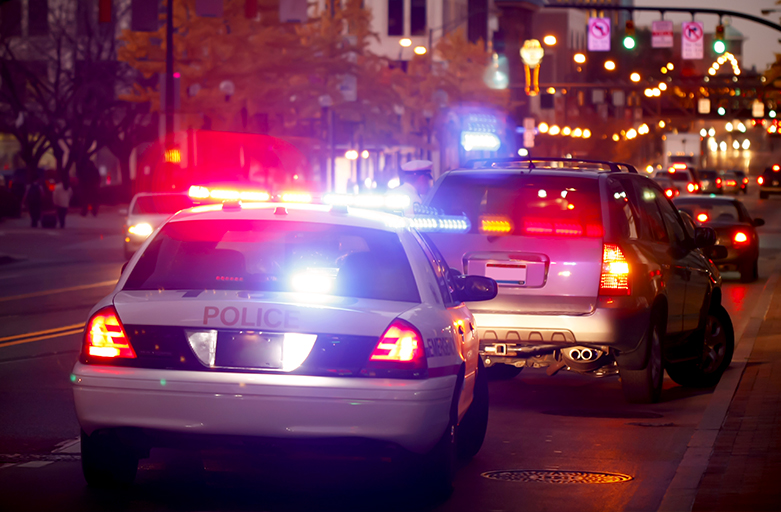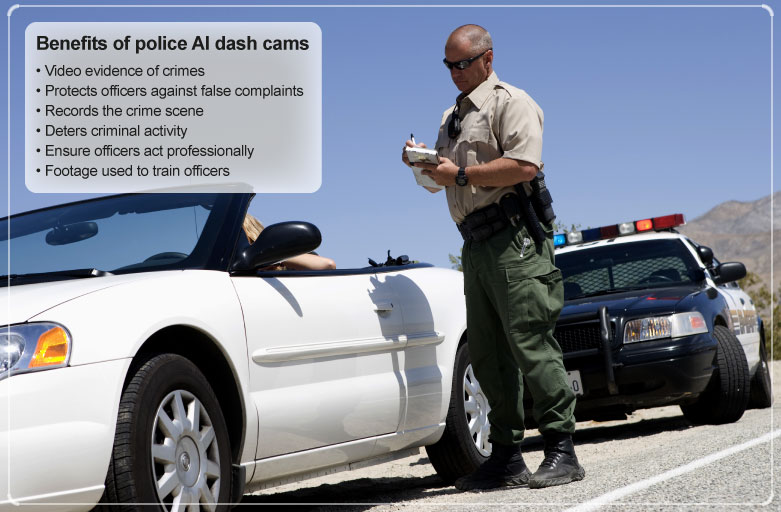Gone are the days when policing the community just came down to gathering physical evidence and noting down competing statements about what happened. As video camera technology has become smaller and higher-quality, far more of the work police do is likely to be recorded, whether by CCTV, bystanders with smartphones, or more recently by body cams and AI dash cams.
If you’re worried about increased private and state surveillance, you might not welcome the prospect of the police being equipped with extra recording equipment. However, the videos recorded by police are, by their very nature, likely to contain a useful record of disputes, law breaking, crime scenes, and the police’s response to them. As such, they can be extremely valuable tools for improving community safety, as well as ensuring that police officers conduct themselves appropriately and are held more accountable.
Police AI Dash Cams Provide Valuable Evidence
Police vehicles are a fundamental ingredient of road and community policing and represent one of the most effective tools in law enforcement. Police cars, vans, and motorcycles spend their time on the roads or parked at incidents and accidents, which means that in-vehicle dash cams have the potential to gather a significant amount of evidence.
Simply by being out in the community, police vehicles can act as a deterrent to law breaking and anti-social behavior. Equipping vehicles with AI dash cams amplifies the benefits. When would-be offenders realize that not only are police patrolling the area, but that their vehicles are recording video footage too, they’re less likely to break the law.
The evidence supports this. A 2017 study of more than 250,000 crimes investigated by British Transport Police revealed that when CCTV was available, it was useful to investigators two thirds (65%) of the time. Similarly, police dash cam footage can be invaluable in recording traffic offences, or other crimes/disturbances the police attend. At an incident, police dash cams can capture who was there and how people acted.
This video record is invaluable in securing prosecutions. A 2003 report by the International Association of Chiefs of Police (IACP), covering video evidence-gathering by US forces, found that 91% of prosecutors had introduced police dash cam evidence in court. More recently, London’s Metropolitan Police force revealed that community-sourced videos supported up to 300 driving prosecutions per month.

Policing the Police
Equipping police vehicles with AI dash cam technology clearly helps in the fight against crime, but recording the police also increases public trust in law enforcement officers. Policing standards can vary, particularly where officers are on patrol without direct supervision, sometimes leading to error, bias, and even misconduct.
Back at the station, police supervisors can review everyday police performance, using their analysis to address problems through training or disciplinary action. Furthermore, the knowledge that their conduct is being recorded ensures that incidents of police harassment and racial profiling are reduced. This works both ways, helping to protect officers too. Where a complaint has been made, dash cam and body cam footage help to establish the facts of what happened, safeguarding officers against false claims.
Perhaps unsurprisingly, the presence of in-vehicle cameras has also been shown to improve professional standards among police. Police officers who know they are being recorded are more likely to act professionally, to be more considerate in their responses, and to adhere to the law and policing guidelines.
In the IACP study, 8% of responding officers reported that fewer complaints had been lodged against them since the introduction of in-car cameras. The report suggested that cameras were responsible for improved professionalism by the police, and improved courtesy between the police and the public.
The positive benefits of police AI dash cams are further enhanced when devices record both the front view of the road ahead and the cabin interior. Where police officers and those they have in custody are being recorded, assaults and arguments are far less likely to occur or escalate. Discussions and altercations are recorded in full, meaning that both sides are protected from threats, intimidation, and false claims.

A Driving Force for Good
The latest generation of AI dash cams and drive recorders are fast becoming an essential tool for modern police forces and law enforcement agencies, protecting officers and the communities they serve. By combining high-resolution, dual-camera recording with GPS location data and 4G connectivity with live updates via a cloud-connected management system, AI dash cams allow police forces to monitor officers in real-time.
Just as importantly, by capturing police work as it happens and making it available both in real time and for later review, the latest AI dash cams ensure that police forces are more accountable. Where police vehicles are recording, communities can be reassured that officers are far more likely to be courteous and work to higher professional standards. And should police standards slip, there’s more likely to be video evidence to support a complaint. Either way, the end result is safer communities that are protected by better trained and more professional officers.
In recent years VIA has garnered extensive feedback from customers operating in the broader Fleet Management sector. This has given us valuable insights that have helped hone our approach to product development. The result is the VIA Mobile360 D700 AI Dash Cam, a full-featured, compact dual-camera device with support for Forward Collision Warning, Lane Departure Warning, and an advanced Driver Safety System. The VIA Mobile360 D700 is AWS IoT Core Qualified and AWS Kinesis Video Streams Qualified. It comes with a 30-day free trial of the VIA Fleet Cloud Management Portal powered by Amazon Web Services (AWS), including 50 hours of live streaming with Amazon KVS.
Learn more about the VIA Mobile360 D700 AI Dash Cam here.
You can also watch this short introductory video:
